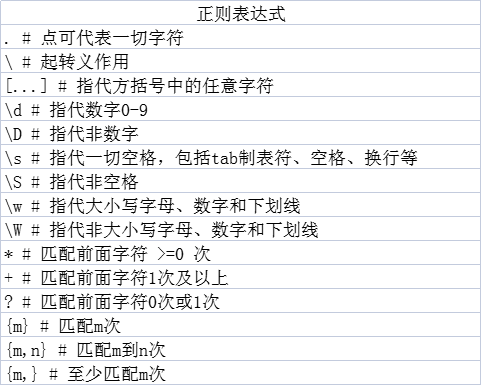python之正则表达式 re.findall 用法
1 | |
findall(pattern, string, flags
=
0
)
第一个参数,正则表达式
第二个参数,搜索的是那些字符串
第三个参数,匹配的模式,其中re.S使匹配包括换行在内的所有字符。findall()函数是逐行匹配的。
一、正则表达式的含义

懒惰匹配与贪婪匹配。
表达式 .* 的意思很好理解,就是单个字符匹配任意次,即贪婪匹配。
表达式 .*? 是满足条件的情况只匹配一次,即懒惰匹配
1 2 3 4 5 6 7 8 9 10 11 | var str = 'Anna is {age} years old,Bob is {age} years old too';var expr = /{.*?}/g;console.log(str.replace(expr, '13'));命令行输出: Anna is 13 years old,Bob is 13 years old too可以看出,懒惰模式下,只要满足条件,就不再向后匹配,以下是贪婪模式:var str = 'Anna is {age} years old,Bob is {age} years old too';var expr = /{.*}/g;console.log(str.replace(expr, '13'));命令行输出: Anna is 13 years old too |
返回string中所有与pattern相匹配的全部字串,返回形式为数组
1 2 3 4 5 6 7 8 | 符号^表示匹配以https开头的的字符串返回,regular_v2 = re.findall(r"^https","https://docs.python.org/3/whatsnew/3.6.html")print (regular_v2) # ['https']用$符号表示以html结尾的字符串返回,判断是否字符串结束的字符串regular_v3 = re.findall(r"html$","https://docs.python.org/3/whatsnew/3.6.html")print (regular_v3) # ['html'] |
1 2 3 | # [...]匹配括号中的其中一个字符regular_v4 = re.findall(r"[t,w]h","https://docs.python.org/3/whatsnew/3.6.html")print (regular_v4) # ['th', 'wh'] |
1 2 3 4 5 6 7 8 9 10 | “d”是正则语法规则用来匹配0到9之间的数返回列表regular_v5 = re.findall(r"\d","https://docs.python.org/3/whatsnew/3.6.html")regular_v6 = re.findall(r"\d\d\d","https://docs.python.org/3/whatsnew/3.6.html/1234")print (regular_v5) # ['3', '3', '6']print (regular_v6) # ['123']小d表示取数字0-9,大D表示不要数字,也就是出了数字以外的内容返回regular_v7 = re.findall(r"\D","https://docs.python.org/3/whatsnew/3.6.html")print (regular_v7)# ['h', 't', 't', 'p', 's', ':', '/', '/', 'd', 'o', 'c', 's', '.', 'p', 'y', 't', 'h', 'o', 'n', '.', 'o', 'r', 'g', '/', '/', 'w', 'h', 'a', 't', 's', 'n', 'e', 'w', '/', '.',<br> '.', 'h', 't', 'm', 'l'] |
“w”在正则里面代表匹配从小写a到z,大写A到Z,数字0到9 regular_v8 = re.findall(r"\w","https://docs.python.org/3/whatsnew/3.6.html") print (regular_v8) #['h', 't', 't', 'p', 's', 'd', 'o', 'c', 's', 'p', 'y', 't', 'h', 'o', 'n', 'o', 'r', 'g', '3', 'w', 'h', 'a', 't', 's', 'n', 'e', 'w', '3', '6', 'h', 't', 'm', 'l'] “W”在正则里面代表匹配除了字母与数字以外的特殊符号 regular_v9 = re.findall(r"\W","https://docs.python.org/3/whatsnew/3.6.html") print (regular_v9) # [':', '/', '/', '.', '.', '/', '/', '/', '.', '.']





【推荐】国内首个AI IDE,深度理解中文开发场景,立即下载体验Trae
【推荐】编程新体验,更懂你的AI,立即体验豆包MarsCode编程助手
【推荐】抖音旗下AI助手豆包,你的智能百科全书,全免费不限次数
【推荐】轻量又高性能的 SSH 工具 IShell:AI 加持,快人一步
· winform 绘制太阳,地球,月球 运作规律
· 震惊!C++程序真的从main开始吗?99%的程序员都答错了
· 【硬核科普】Trae如何「偷看」你的代码?零基础破解AI编程运行原理
· 超详细:普通电脑也行Windows部署deepseek R1训练数据并当服务器共享给他人
· 上周热点回顾(3.3-3.9)